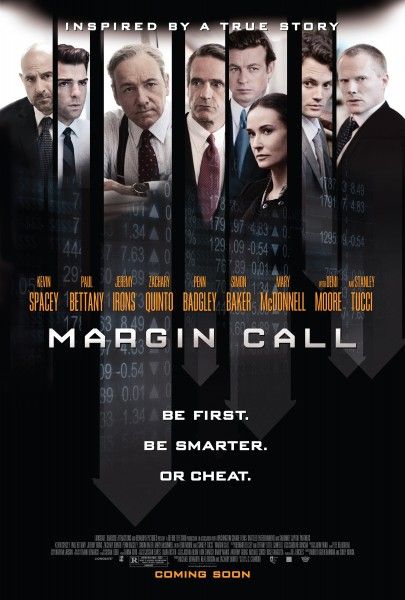The 2008 economic collapse is one of the major events of our lifetimes and some filmmakers have rushed to turn the events into A Very Serious and Important Movie. J.C. Chandor's Margin Call would like to be that movie. It dresses up its respected cast in fine suits, puts them in the financial world, and then has them look at computer monitors and say "Fuck me..." in astonishment about 80-90 times throughout the course of the film. Chandor wants to bury the audience in the world of financial intrigue and corruption without doing the hard work of explaining the machinations of that world in any kind of detail. He gets away with it for the first half-hour as the audience becomes wrapped in a propulsive, plot-driven drama, but by the end the only saving grace is Kevin Spacey playing against type.
Margin Call takes place over a 24-hour time period in a major financial firm. The day begins with an executive in risk management (Stanley Tucci) getting fired, but before he leaves the building he gives a thumb-drive to his employee (Zachary Quinto) with the warning, "Be careful." The employee, a former rocket scientist, cracks the data on the thumb-drive and calls his superior (Paul Bettany) who looks at the data and says, "Fuck me..." He then calls his superior (Spacey) who looks at the data and says, "Fuck me..." He then calls his superiors (Simon Baker and Demi Moore), "Fuck me...", up the chain, and so forth until it reaches the big boss (Jeremy Irons).
Despite the repetition, Chandor is able to keep the momentum and drive of his script going throughout the first act, but then the story and momentum collapse as the particulars of this financial firm become less and less believable. Movies like this are usually filled with technical jargon and require an audience surrogate so another character can explain the complexities in layman's terms. That audience surrogate should not be a higher-up. Quinto has to explain to Spacey that the data means the company has loads of crap on its books based on shoddy projections and that the firm will be dead in a few weeks if they can't get rid of it. Later, Quinto has to explain to Irons that how the crap came from the mortgage market. Both Spacey and Irons have lines like "You know I don't understand this stuff," and "Explain it to me like you would a child."
Chandor may be trying to imply that the fault of the financial meltdown was from sheer recklessness and stupidity, but that's a simplistic and inaccurate understanding of the crisis. Spacey's character may be a salesman whose best trait is his ability to inspire his employees, but we have to believe he doesn't understand financial figures and the value of his product. We also have to believe that Irons' character stumbled out of the ether, and idiotically took over a financial institution. If Chandor truly believes this, then he has essentially removed any blatant greed or criminality from financial firms. Even if this fictional company isn't meant to stand in for a dead firm like Lehman Brothers or Bear Sterns, we still have to believe that nobody knew anything and that simply isn't true.
When you remove that responsibility, then Margin Call could not come at a worst time. There's no tragedy at play since these character have no one else to blame and the movie only plays to an audience that thinks, "Boy, I hope these rich Wall Street executives make it out okay." The story lacks drama and insight because most of the characters wander around dumbstruck by the impending calamity and only Bettany hits upon the salient point that the American people will be furious at the Street for the collapse, but no one asked where the money was coming from as long as it kept rolling in. It's an idea that would work far better if Chandor ever took a step outside the firm and introduced an everyman who could not only serve as an audience surrogate, but also as a representative of how the collapse will affect the average person. But there is barely any world beyond the firm and we have to spend time with empty suits worrying about their jobs.
The only character we only get to know is Spacey's (although Tucci gets a meaningless speech about a bridge he built), and the respected actor does a great job playing against type. We all know he can do a heartless executive in his sleep and he's also played the high-profile fraud with his portrayal of Jack Abramoff in Casino Jack. But in Margin Call, his character is faced with a moral choice, which makes him one of the story's few sympathetic characters. The film lets him off the hook with his ignorance of how the meltdown happened, but it puts him in the driver's seat for how he's going to react. There's no smarm to Spacey's performance and it's a nice change of pace for the actor.
Unfortunately Margin Call wastes the rest of its talented cast by making them nothing more than plastic figures moving around a poorly constructed play set (Note to toy manufacturers: do not make the Financial Firm Play Set). The devil is in the details and Chandor wants to make a movie without devils or even people. We need a good film about the financial collapse, but if Margin Call is the best we can get, then fuck me...
Rating: C-


